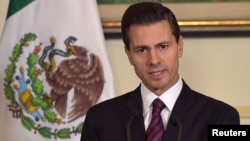The dramatic escape on Saturday of the world's most notorious drug lord has raised pressure on Mexican President Enrique Pena Nieto to curb corruption and the drug gangs that play an outsized and violent role in his country.
Speaking from Paris, where he was beginning a four-day state visit just as Joaquin "El Chapo" Guzman was breaking out of jail, Pena Nieto called the escape an "affront to Mexico" and promised a full investigation. But skepticism is rife in Mexico.
In February of 2014, when Guzman was re-arrested after a previous jail break, Pena Nieto said another escape by the drug kingpin would be "unforgivable." Since the latest escape Pena Nieto's critics have reminded him incessantly of that statement.
Opposition politicians have also been quick to note that he did not cut his Paris trip short, despite calls for him to do so. And members of the ruling party and opposition alike are convinced that the escape had to have been an inside job.
The mile-long tunnel would have required noisy digging equipment and produced tons of dirt to be disposed of, they note. Moreover, the tunnel came up exactly under the shower in Guzman's cell, which suggests that the drug lord's accomplices had detailed information about the prison's design.
"There had to have been complicity," said Ricardo Pacheco, a congressman in Pena Nieto's ruling Institutional Revolutionary Party, or PRI, who heads the lower house justice committee. "To have done a thing like this, you need immense quantities of all kinds of resources: material, technical and human."
The escape came after a difficult 12 months in which Pena Nieto's approval ratings had already fallen to multi-year lows.
Allegations of extra-judicial killings by the army, and of collusion between police and a drug cartel in the apparent massacre of 43 trainee teachers last year sparked mass protests.
Since then, the president has sought to convince Mexicans that their country was turning the corner, with a series of judicial and anti-corruption reforms.
El Chapo's escape has seriously undermined that claim.
So far, 31 prison officials, including the facility's head, have been taken in for questioning over Guzman's escape.
But the attorney general's office had not interviewed people living in the immediate surroundings of the prison as of midday Monday, a spokesman for the office said.
Attention is also being focused on a nearby waterway expansion project begun about a year ago. An open ditch with three reinforced tubes 2.5 meters wide snaked around the prison, offering "the perfect screen so people wouldn't notice the work on the escape tunnel," said a soldier who declined to be named.
Malcolm Beith, a biographer of the drug lord, said Guzman's allies probably obtained details on the facility's layout.
"I can only imagine Chapo or someone in his circle was given the blueprints of the prison," he said.
Two soldiers and one policeman, speaking on condition of anonymity, said that the alarm was not raised over Guzman's disappearance until after 10 p.m., more than an hour after the government said he was last seen at 8.52 p.m.
Elena Azaola, a prison expert at research center CIESAS, noted that the building that housed Guzman met international standards of a high security penitentiary.
"It's impossible to escape from that prison without total complicity from the authorities and/or guards," she said.












